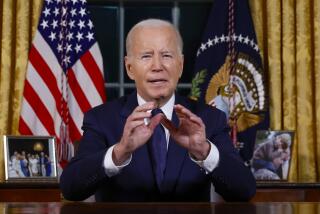Spaniardâs Triumph May Be His Downfall
MADRID â In a calmer world, the close alliance that Spanish Prime Minister Jose Maria Aznar has forged with President Bush could have been the crowning achievement of Aznarâs political career.
Thereâs only one problem: Most Spaniards are dead set against a war in Iraq. Rather than celebrating a new partnership with the worldâs only superpower, they have declared their displeasure in some of the biggest antiwar marches in Europe.
Like his friend Prime Minister Tony Blair of Britain, Aznar has been paying a cost for his hard-line policy on Iraq. Some of his allies here mutter that he has lost his political touch after nearly seven years during which he cut unemployment, cracked down on Basque terrorism, won a landslide reelection and presided over an economic and cultural boom.
Spain has flexed its diplomatic muscles during the Iraq crisis, joining the United States and Britain at the United Nations in sponsoring a proposed Security Council resolution authorizing the use of force against Iraq. Last week, Aznar became one of the few world leaders to visit the Bush ranch in Texas: a milestone for a pragmatic, steely former tax inspector who narrowly escaped a car bombing in 1995.
At home, however, the Socialist opposition has overtaken Aznarâs center-right Popular Party in polls as May regional elections approach. Antiwar feeling among voters, more than 70% of whom disagree with Aznar on Iraq, transcends party lines.
Nonetheless, Aznar seems unruffled. In an interview Friday, he said Spain must stand by the U.S. during one of the most difficult moments in modern history.
âI want Europe and the United States to have a strong relationship,â he said. âWhen Europe and the United States have been divided, the world has paid a high price.... I sincerely donât think getting agitated by anti-Americanism is a good idea. Maybe there are people who are nostalgic for the Berlin Wall. We need each other mutually, more than some might think.â
Aznar said he hopes that the U.N. will disarm Iraq peacefully and that the U.S.-British-Spanish resolution can win nine votes in the Security Council. His government has pledged to provide air bases in the event of a U.S. military operation and to send troops to help defend Turkey.
Asked about widespread expectations that he would support a U.S. attack even without U.N. approval, Aznar responded, âSpain will know its place.â
Aznar tends to go with his instincts, keep things simple and avoid the torrential rhetoric that is common in Spanish politics.
Perhaps because of his familyâs contacts with Mexico and with Latinos in Florida and Texas, Bush seems more comfortable with the down-to-earth Aznar than with the more formal French president, Jacques Chirac, or Germanyâs center-left chancellor, Gerhard Schroeder. The Franco-German antiwar initiative has chilled Bushâs relations with those two, who see themselves as making up the power center of Europe.
Aznar, for his part, has clashed periodically with Chirac and Schroeder, as Spain, Britain and Italy have challenged their dominance of the European Union. The Spanish-British-Italian bloc has grown closer during the Iraq dispute and could gain strength with the entry into the EU of pro-U.S. countries from Central Europe.
Aznar turned 50 last week. He seems younger, but his solemnity suggests he looked older than his years when he was 20. He granted an interview Friday evening in his official residence at the Moncloa Palace, which was patrolled by a couple of bodyguards and a gray cat.
Aznarâs week had taken him from Texas to Paris to Rome to Madrid, a packed schedule that included an audience with Pope John Paul II and a meeting that morning with Blair. During the weekend that Aznar spent in Crawford, Texas, he said, he and the president had long talks about Iraq, the world and their families, even though communication was complicated.
âWe speak a little bit in Spanish, a little bit in English, a little Spanglish and also with an interpreter,â said Aznar, smiling. âWe understand each other well.â
Aznar said he and Bush discussed the visceral dislike that many Europeans feel toward the president. When a million marchers led by politicians and artists such as film director Pedro Almodovar protested last month in Madrid, some of the loudest voices condemned Bush as a worse danger than Iraqi President Saddam Hussein.
âThere is a prejudice against Republicans from Texas,â Aznar said. âThose who you hear the most are those with these ideas. But there are many people, whom you might not hear, who donât share these ideas.â
Aznarâs embrace of the superpower across the Atlantic has distanced him from a Spanish diplomatic tradition that emphasized relations with Europe. His shift is based on the expectation that the U.S. will resolve the Iraq crisis decisively, critics say -- but they call it a gamble.
âItâs very dangerous for Spanish interests,â said Jose Maria Ridao, a former diplomat and writer. âItâs a policy without anchors. Aznar has decided to make a decisive gesture in favor of Bush, and he puts Spain at the mercy of a future U.S. administration that may not have the same attitude. Itâs very advantageous for Bush, but I donât see what Spanish citizens gain.â
Aznar responds that he was elected to make difficult choices, not politically expedient ones.
âThe citizens will decide,â he said. âI am aware that we are incurring significant costs. But I am also convinced that the citizens will appreciate the consistency and the responsibility of a policy that seeks sincerely for peace and liberty to be the rules for the future.â
Aznar has said for several years that he will not run for a third term in 2004. Some commentators say he has risked damage to his party because he sees Hussein as a menace and because he wants to position Spain as an emerging force with strong ties to the United States, whose burgeoning Latino population fascinates him, as well as to Europe and Latin America, the countryâs traditional spheres of influence.
âHe sincerely believes that by taking the path of fumigating Saddam, Spain will create friendly bonds with Britain and the United States ... and that this will be his legacy for which history will judge him,â Martin Prieto wrote Saturday in the newspaper El Mundo.
In 1996, Aznar upset Socialist Prime Minister Felipe Gonzalez, who during a 13-year tenure became the dominant figure in Spainâs transition from a dictatorship that ended in 1975.
Gonzalez was a charming Andalusian intellectual. Aznar was a dry Castilian bureaucrat. But he preached efficiency and represented a reformist generation in a country wearied by corruption and economic stagnation.
As Aznar balanced budgets and cleaned house, he achieved a breakthrough: He remade the center-right as a viable democratic force. His management style was conservative with modern touches, such as his appointment of women to posts including the leadership of the Foreign Ministry.
The fight against the ETA, the Basque terrorist group, has driven Aznarâs political career at home and his focus on terrorism in foreign policy.
Aznar traces his alliance with Bush to the presidentâs visit to Spain in the summer of 2001, during his first official trip to Europe, when Bush promised to do all he could to help combat the ETA. Unlike other Europeans, including some of his own counter-terrorist officials, Aznar accepts the U.S. thesis that Iraq has ties to Al Qaeda and is a logical foe in the worldwide campaign against terror.
âSome people discovered terrorism only after Sept. 11,â he said. âIf the United States expressed its solidarity with Spain against terrorists, I think Spain must offer its solidarity to the United States after it was attacked -- because this is a global menace to the world, in which there exists the threat that terrorists could obtain weapons of mass destruction.â
More to Read
Sign up for Essential California
The most important California stories and recommendations in your inbox every morning.
You may occasionally receive promotional content from the Los Angeles Times.









